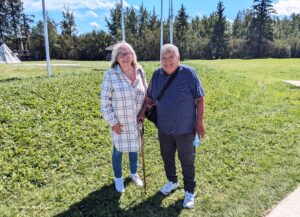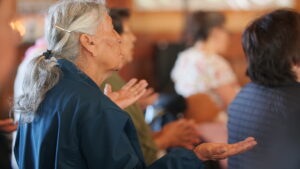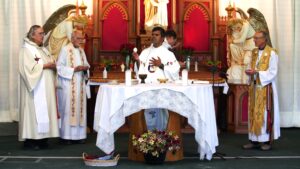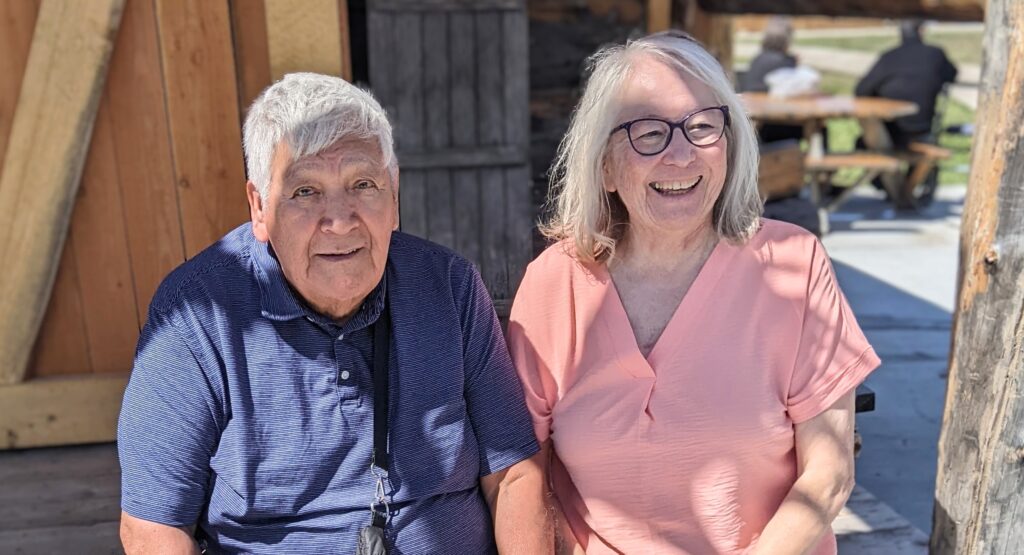Frank and Florence Large are from Saddle Lake Cree Nation, about 200 kilometers northeast of Edmonton. They are both Catholics who returned to their faith later in life and they are passionate about healing the relationship between Indigenous communities and the Church.
The Larges, who are both recovering addicts and retired addiction counselors, provided support for residential school survivors and their families during the 2022 Papal Visit. Frank attended residential school as a child and Florence’s mosôm – Grandpa – taught at a residential school. Frank and Florence are also long-time volunteers at the Lac Ste. Anne Pilgrimage.
As Canada marks Truth and Reconciliation Day on September 30, Frank and Florence share their story of finding the truth of Christ on their personal journeys of healing. The heart of this interview is a conversation with two individuals who love Jesus and who want others to know the true Jesus, who is unobscured by trauma and human corruption.
On growing up and going to residential school
Frank – I went to residential school, at Blue Quills Residential School. I went there for 13 years. I had no choice; my parents had no choice. But you know, I speak only for my family: the residential school helped us survive. My parents were kind of like gypsies, traveling, working for farmers, and that’s how they made a living. They had their tents and a wagon. I would go with them, a lot of the time.
I remember staying in a tent all winter, because my dad was working for a farmer. So it was, in its own way, it was a good life, you know? I didn’t know we were poor. I have probably eaten every kind of animal there is to eat. That was our way of survival. I have eaten skunk. And people have asked me what that is like to eat a skunk. And I said, ‘You know, well, it’s a lot like hors d’oeuvres!’”
Because I grew up Catholic, having been raised primarily in residential school, I went to church every morning, as a kid. During the school year, a priest asked me, “Frankie, you know, you can go to a minor seminary in Manitoba, if you want, but you have to have your parents’ permission.” So I brought this paper home and I told my dad all about it.
My dad said: “You know, son, I admire your ambition, but I want you to spend one year at an integrated school (with non-Indigenous students) and see what you can expect.” So I did. After a year was over, I decided that no, that was not my call. And I’m grateful for that. But I think I would have been a real badass priest, you know!
On finding healing and freedom from addiction
Frank – I was about 24 when the (alcohol) addiction hit really hard. Yeah.
Florence – Yeah, and then he quit in 1988 when he was about 43. I remember, because we met when you were 41, and [he] carried on for another year and then we both quit at the same time. October 29, 1988, is his sober date.
Both of you struggled with alcohol?
Florence – Yeah. Both of us, alcohol mainly. And then cigarette smoking.
Florence, for how long did you struggle with addiction?
From the time I was probably 19 until I was about 37. My sober date is October 27, 1988.
Your sober dates are just two days apart. How did you find freedom and healing from addiction?
Frank – I realized that I was so tired. I was so tired of waking up with hangovers. And because I was a blackout drinker, it bothered me, that I couldn’t remember. I thought, “Oh my goodness, I can’t carry on with this, you know?”’ That’s when I decided to quit.
Also, things were happening in [my relationship with Florence]. We had been living together and because of my drinking, she had moved out [to a shelter]. That was a catalyst. I made up my mind and I was going to do it for myself. It wasn’t for her. I made up my mind for myself.
When you both quit drinking, did you know Jesus? Did you practice your Catholic faith?
Florence – Yes, we were slowly going back to church. But we were just one-hour Sunday Catholics.
When we first quit, [our faith in Jesus] was major, major because we both took the Cursillo, the native Cursillo, in 1989. That’s what really, really turned our lives around.
Frank [has said] before, he learned at residential school that what really mattered was sin and that you will go to hell for your sins. So [I think] that gave him the justification to drink like he was going to hell anyway. But then [through Cursillo] we really went hard in following our brother Jesus.
Frank, how did the Cursillo retreats change your life?
Frank- You know, before getting to know Jesus through Cursillo, I was doing everything in my Catholic faith out of guilt.
And then when I went to Cursillo with my native brothers being there, and then there were these priests there who helped me; they introduced me to “Our Father.” The God who is kind. He is forgiving and he’s gentle.
That was the kicker for me. That’s what attracted me. I realized “Wow, this is good. I don’t have to keep wallowing in my guilt.” That’s what changed me. When that happened for both of us – wow, we weren’t shy. We went full Catholic.
If someone is struggling, what would you share with them about how Jesus has walked with you towards freedom from your addiction?
Florence – It’s their belief in a higher power that will get them through. . . because as much as people will be there for you there’s always going to be times when you’re absolutely, physically alone. And so I say that the Creator’s always, always there. We’re the ones who abandon Him. Jesus is the one who’s going to lead you the whole way.
On childhood trauma, abuse, and healing from addiction
Florence, you shared that you quit drinking in October 1988. Can you share more about how you quit and what happened before you quit?
So [Frank and I] met in 1987. We met at a bar. Dancing! But then he was blacking out more and he started to be physically abusive.
Frank – Yes, that was me, and that was the way that it was for my first marriage. I made my first wife suffer, but I did that under the influence.
Florence – Yes, he was bad under the influence. But not under the influence: a good guy.
Frank – Maybe a lot of it was my childhood and the way that things happened at home. My mom was physically abused by my dad. I also saw him sometimes be abusive when he wasn’t drinking. Those were the times that really hurt me.
Florence – I had a very similar childhood when it came to family violence. And what it was, for me, was my mom’s faith in God, my mom’s devotion to the Blessed Mother through the Rosary. And that was the same with my granny. I have more of a relationship with my granny than I did with my mom. When I think back to the whole alcohol cycle, I believe that when I was born, I think my mom was just tired of having kids, but then she had five more after. I became the caregiver of the younger ones, with my granny. So that’s why I really bonded with my granny; she had such unconditional love.
So you said that it was your mother’s and your grandmother’s devotion to Mary that really helped you get out of addiction?
Florence – Yes, it was all of those childhood teachings that came back to me once I took the Cursillo retreat. That’s where I found a forgiving God. That’s where I found the ability to forgive myself for the things I had done in my lifetime, that I consider were really, really sins. That’s where I learned that I could get through life, with grace from God.
But like [Frank], I was sick and tired of being sick and tired [with my addiction].
I didn’t classify myself as an alcoholic until I took my addictions training to become a counselor, years later. I will say that I probably have never blacked-out, but several times a year I would get so wasted. I would do such stupid things when I drank.
All those years that I was drinking, I was carrying myself around so aggressively, with a heart of stone, like “no man’s gonna make me cry” and all of this stuff and yet thinking that the right man would be the answer to everything.
But is Frank the answer to my all? No. There’s only one man who is the answer to my all, and that is Jesus!
Frank (with a twinkle in his eye): Don’t call me Jesus!
Florence: Not a chance!
Basically, I had started my journey before meeting Frank. I had a great counselor. What really brought us both back to the Catholic Church was the Cursillo retreats and the priests with Cursillo. I get goosebumps even thinking about it.
It was the priests who worked with us. Yeah, those priests [at the Cursillo] were so different. They were human. They were different from the preachers we knew from residential school.

On staying Catholic and integrating Catholicism and Indigenous tradition
Now, for various reasons, there are many Indigenous people who have left the Catholic faith. Why have you stayed Catholic? Why are you Catholic?
Frank – You know, Catholicism runs strong in my family. My grandfather, my grandmother, and my parents. I was there when we first built our new parish church – Sacred Heart Church in Saddle Lake. I remember when that church was just a basement. We had Midnight Mass in the basement.
Inside this basement, there was some dirt, a big pile of dirt. We would use it to spread around on the ground. Now, with a friend of mine – who is now passed on – while the Mass was going on, we would be mischievous, sliding down the pile of dirt. Those are my first memories of the church!
Florence – So you asked a very, very pertinent question. My answer is: There’s one Holy Creator, God of All That Is, and that Creator is the Creator of all of our nations in the world. . . Now, it is my belief that our native people have swung very strongly to their traditional ways. However, many of them still hold on to the Catholic ways of worship. And I think we’re in transition right now. Can we learn transition? That’s where I am at. That’s where we are at. We blend the traditional ways with our Catholicism.
What about the Eucharist? What do you believe about the presence of Jesus in the Eucharist?
Absolutely. . . We believe it is Jesus. Yes. And that is what keeps us believing. We also believe in the Blessed Mother.
Frank – We believe that everything has a spirit. In a sweat lodge, we use these rocks, we refer to them as “grandfather rock”, and the animals have a spirit. Like when my people are hunting, when they kill a moose, this part of the beard is cut off and then they hang it on a tree, where the kill happened, in thanksgiving. Grandfather moose is giving his life, so that we can eat it.
Florence – So everything has a spirit in the Creator’s creation. However, we are built in the image of God. We are people in the image of God, we are the ones with a soul. That is my way of differentiating, between everything, which has a spirit, and humans, who have a soul.
A memory of Eucharistic healing
Frank – You know, the Lac Ste. Anne Pilgrimage actually helped me to make peace with my residential school experience. My residential school experience wasn’t as devastating as some stories are, but I don’t doubt those other stories.
One day at Lac Ste Anne, I said to Father Fred (Groleau): “Why don’t we have Benediction?”
They had stopped doing Benediction at the pilgrimage, but Father Fred thought it was a good idea. So we did it and we sang “Tantum Ergo.” And then everyone was singing “Tantum Ergo” all together.
Florence – Father Fred was shocked that Frank could sing like that! With everyone singing together we were just like “Wow!”
So that moment of Benediction was a healing moment?
Frank – Yeah. Major healing. It brought me back. I remember being in residential school. It was the springtime and we were in the chapel and there was a breeze. The windows were open. And I could smell the lilacs. We were all singing that song, “Tantum Ergo.” As an altar boy, I knew all my responses, because we learned a lot of Latin … Yes, yes a beautiful memory of that time, as a child.

The healing impact of a priest sharing about his own addiction
Florence – [One night at the Lac. St. Anne pilgrimage] it was the night of the sobriety pledge, which is when we give people a candle and then they pledge for one year to give up their alcohol or their addiction. They needed someone to share a testimony. And Father Fred looked at Frank and said: “Well you can do it!”
At one point there was a priest we knew who walked over because he had to see who was talking. He had his own demons, [this priest] was also an alcoholic who had overcome it. Listening to Frank, he realized he was getting very complacent about his sobriety. So he came over. And he thanked Frank for his story.
Frank – It was quite an evening. There weren’t many people in the shrine when I started sharing, but then by the time I was finished, it was full. It was humbling.
Florence – And another priest friend of ours shared his story at the pilgrimage, of how his mother was an alcoholic.
Frank – Yes, what an impact! A major impact. A priest talking about addictions in his family, and a priest sharing about his own addiction.

On the 2022 Papal Visit
It’s been a year since Pope Francis came to the Archdiocese of Edmonton. How does that all feel for you?
Florence – We actually managed to get into Sacred Heart Church of the First Peoples when the Pope came!
Frank and I were asked by Health Canada to brief all of the 245 psychologists and psychiatrists who were there to take care of people struggling with trauma. We briefed all of the first responders who were commissioned for the Edmonton part of the Papal Visit, to share with them how to respond to the trauma they would encounter.
It was totally awesome! However, on the last day of the Pope’s visit here, when we did the debriefing with the care providers for the Papal Visit, there were a lot of people who stated that the elders were not really cared for as well as they could have been, because of all the stringent policies put in place by government and Vatican security.
There were about 40 native first responders, and all of the rest were non-Indigenous. I told them, “Welcome to the Indigenous world.” I also said, “The guilt is not yours to carry as to what has happened to the Indigenous people. However, because you know now and you’re aware, and if you do nothing, then yes, then the guilt is yours.”
Despite some of these challenges, do you believe that Pope Francis’ visit brought about healing?
Florence – Oh, for the majority of people, yes! Otherwise, they probably would not have attended. They wanted healing. They wanted the apology. I felt I was blessed being in the church with the Pope. I believe our being there was meant to be. Otherwise, we would have just watched him on TV.
Frank – For me to see him up so close at Sacred Heart Church – he was right there in his wheelchair – and he waved and it was like he said to me “Hey, buddy!”
On forgiveness in the most difficult circumstances
How do you believe your people – and the Church – can actually heal?
Frank – I see [reconciliation] as a challenge for my people. I heard an elder say last week, at a funeral, he told the people [in Cree] : “You are the chosen ones. God has chosen you to take a family member so that you can be made stronger. So you have been gifted with a mindset where you can ask yourself, “What have I learned from this?”
When terrible things happen, how does someone forgive?
Florence – We have forgiven. Yeah, the only way that one can really, truly forgive is if you have spirituality in your life, and if you have Creator in your life, right? Because you can go through the actions, but do you really, truly forgive? You have to be at peace with God, you have to be at peace with your decision to say “I forgive.”
Why do you love Jesus, even amid the suffering that you have experienced?
Florence (responding in tears) – It was a long journey I went through to get there. I was taught a different Jesus. And at the Cursillo I found the forgiving Jesus. And I was also taught that if Jesus can forgive me, I need to forgive myself for all the wrongdoing that I’ve done. I believe He died on the cross for us. I believe in the blood of Jesus. I believe in the prayers. And I also believe that he was a special, special baby to our Blessed Mother.
My life journey is my faith. Faith is believing what I cannot see. That’s where I’m at today. But the journey for me to find that Jesus, the God of my understanding today, is a different Jesus than I grew up with.
And Frank, why do you love Jesus?
Frank – Because he’s a pretty neat dude!
You know, “Jesus” is gentler in Cree. The Jesus that I learned in residential school, I eventually didn’t like him because he was very punitive. “You’ll go to hell, you’ll go to hell.” And you know, I finally came to a point where I gave up on that old Jesus and I said “I want to go to hell anyway,” you know.
But then there is the Jesus that my grandfather and my grandmother taught me. They taught me about “Ekisewâtisit. Kind Jesus.”
We used to just sit there in our old house, with my grandparents, in front of the pot-bellied stove. We would see the light from the stove. My grandfather would sit on his bed and he would tell us about Jesus.
It all revolved around how you lived your life. It all revolved around the Creator. That explains who he is. That’s a kind, kind God and he never does anything without a reason.
.
.
.
Jenny Connelly – Archdiocese of Edmonton
(This interview has been edited for clarity and brevity)

